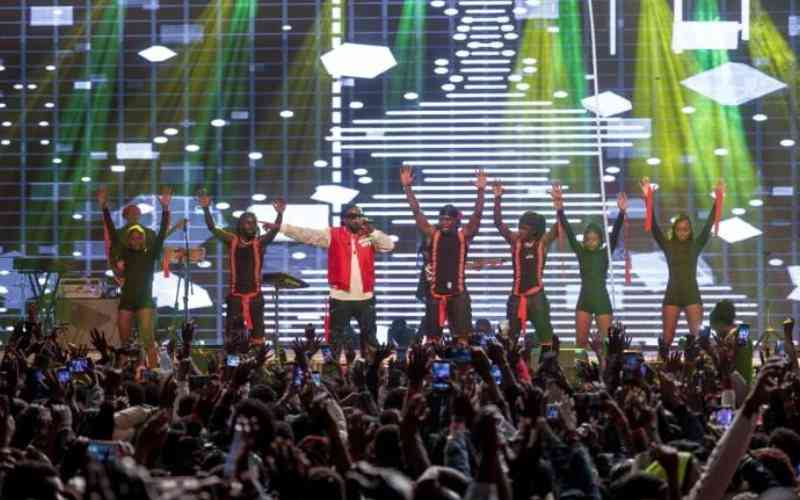
The past few months have seen Kenyans let their hair down, put on their partying boots and sing and dance the evening away to live performances.
From Solfest to Oktobafest, there has been no shortage of experiencing our favourite artistes in the best ways.
But besides the fun and good times, festivals and concerts have become big business. From the tens of thousands of ticket sales to transportation to and from venues- and not to mention food and drinks consumed at these events, lots of money has been spent and made.
According to a report released exclusively to The Sunday magazine by Oktobafest communication executives, the beer festival was on a mission to leave a positive social and economic impact, and they broke down the numbers to explain how they did that.
The report notes that the total number of Oktobafest attendees was over 49,000.
Organisers boasted that this number shows the large number of people who came together to share their love for music.
"Oktobafest extended its reach by partnering with 100 outlets across the region. These outlets became valuable partners in the festival's journey. This partnership was not just about commerce; it was about creating collaborative opportunities that extended beyond the event," the report notes on partnerships, adding that there were 78 vendors who supplied food, beverages and merchandise.
The report adds: "These vendors were not just businesses; they were entrepreneurs with dreams, and [the festival] became a platform for them to fulfil those dreams. It wasn't just about profits; it was about showcasing their talents and offerings to a wider audience."
On matters to do with transport, sources note that there were up to 788 taxi drivers who provided services to and from the venue, and an additional 30 matatus ferrying attendees and service providers.
There were reportedly 114 'talent' engaged in the three-day festival, from artistes to DJs, who found a platform to showcase their skills at the concert. When probed on how much it cost to plan the event, organizers said that the exact figure spent on planning and executing is confidential.
Artistes and high-profile personalities in the lineup included Tanzanian Bongo music sensation Diamond Platnumz, Uganda's Emcee Dedan, South Sudan's John Frog, and local music icons such as Nyashinski, Khaligraph Jones, Mejja, Juacali, Nameless, Wakadinali, and Kalamashaka, among others, as reported by Kenyan Vibe.
The VIP season pass for Oktobafest costs Sh12,000. The day pass for regular tickets went for Sh2000, while the regular season pass was Sh 5000 as per posters of the festival shared by Tusker on X.
Over at Solfest, which was dubbed 'the last dance' of the celebrated boy band Sauti Sol, there was not only an emotional goodbye to the celebrated group taking a hiatus but there were also big bucks being spent.
The festival promised to be a true celebration of Sauti Sol's extraordinary career, and the pricey Sh20,000 VIP tickets were sold out by September, a testament to how eager the fans were for the highly anticipated event.
Tickets for the 'fan show', which was on a different date from the VIP one; cost Sh 2500, and attendees would get an exclusive backstage experience for the raised price of Sh 6500.
An entertainment site reported at the time: "The VIP package promises an immersive experience, including a lavish 5-star banquet-style dinner, welcome drinks, an intimate performance by Sauti Sol, an exclusive merchandise pack, and the coveted opportunity to meet and greet the band."
In an interview with the site, band members Bien Aime Baraza and Savara Mudigi defended the price of the tickets, with Bien saying: "The cost of doing the concert is really expensive as well. We are not trying to take advantage of people.
"We are giving you 20 years of lives; we have been together for 20 years. That ticket price is worth the 20 years we have been together."
The boy band announced via a social media statement at the time: "VIP Tickets sold out! Huge thanks to all our VIPs for grabbing those exclusive passes. But don't fret, our fan show tickets are still up for grabs, but they're vanishing faster than a Kenyan sunset!"

The Star reported that the group was set to make millions from the festival, which saw over 15,000 revellers attend.
The report noted that revellers from different parts of the country showed up to the festival.
"Being their last show as a group, Sauti Sol brought out rappers Khaligraph Jones, Nyashinski, Singer Dela, and P-Unit to help them summarize their 20 years in the industry.
The Boy Band also performed together with Sol Generation Boys - Nviiri and Bensoul who had earlier warmed up the stage for the big Boys. Several DJs and acts from the Sol Generations' ongoing project - Press Play also got to share the stage with Sauti Sol."
Market research firm Statista projected that the music events market in Kenya would reach over Sh592 million (US$3.88 million) this year.
Statista reports: "Revenue is expected to show an annual growth rate (CAGR 2023-2027) of 6.28 per cent resulting in a projected market volume of over Sh747 million (US$4.95m) by 2027."
 The Standard Group Plc is a multi-media organization with investments in media
platforms spanning newspaper print
operations, television, radio broadcasting, digital and online services. The
Standard Group is recognized as a
leading multi-media house in Kenya with a key influence in matters of national and
international interest.
The Standard Group Plc is a multi-media organization with investments in media
platforms spanning newspaper print
operations, television, radio broadcasting, digital and online services. The
Standard Group is recognized as a
leading multi-media house in Kenya with a key influence in matters of national and
international interest.
